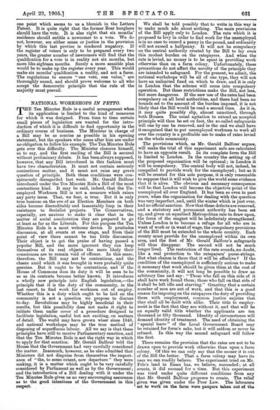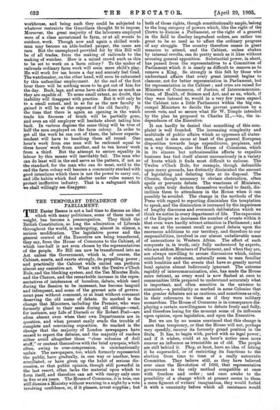T HE Ten Minutes Rule is a useful arrangement when its
application is limited to the kind of measures for which it was designed. From time to time certain small pieces of legislation are wanted for the intro- duction of which it is difficult to find opportunity in the ordinary course of business. The Minister in charge of a Bill may be as concise as possible in his opening statement, but the speakers who come after him are under no obligation to follow his example. The Ten Minutes Rule gets over this difficulty. The Minister closures himself, so to say, and the first reading of the Bill is secured without preliminary debate. It has been always supposed, however, that any Bill introduced in this fashion must have two characteristics. It must not contain seriously contentious matter, and it must not raise any grave question of principle. Both these conditions were con- spicuously disregarded last week. Mr. Gerald Balfour introduced under the Ten Minutes Rule a Bill of the most contentious kind. It may be said, indeed, that the Un- employed Workmen Bill is not a measure which raises any party issue. That, we fear, is true. But it is only true because on the eve of an Election Members on both sides become discreditably and lamentably limp in their resistance to Socialist projects. The Conservatives, especially, are anxious to make it clear that in the matter of social amelioration they are prepared to go at least as far as the Liberals. For this purpose the Ten Minutes Rule is a most welcome device. It precludes discussion, at all events at one stage, and from their point of view there cannot be too little discussion. Their object is to get the praise of having passed a popular Bill, and the more ignorant they can keep themselves of its real objects the more likely their consciences are to remain void of offence. In this sense, therefore, the Bill may not be contentious, and the cheers amid which it was brought in were probably quite genuine. But it ought to be contentious, and if the House of Commons does its duty it will be seen to be so as its contents become better known. It introduces a wholly new principle into English legislation,—the principle that it is the duty of the community, in the last resort, to find work for workmen out of employ. Whether this is a duty which ought to be laid on the community is not a question we propose to discuss to-day. Revolutions may be highly beneficial in their results, but this possibility does not make it right to initiate them under cover of a procedure designed to facilitate legislation, useful but not exciting, on matters of detail. The world may have grown wiser since 1848, and national workshops may be the true method of disposing of superfluous labour. All we say is that these principles have still to receive Parliamentary sanction, and that the Ten Minutes Rule is not the right way in which to apply for that sanction. Mr. Gerald Balfour told the House that the Government had very carefully considered the matter. Inasmuch, however, as he also admitted that Ministers did not disguise from themselves the import- ance of "the, to some extent, new departure" they were making, it is a matter which ought to be very carefully considered by Parliament as well as by the Government ; and the introduction of a Bill dealing with it under the Ten Minutes Rule gives us no very encouraging assurance as to the good intentions of the Government in this respect. We shall be told possibly that to write in this way is to make much ado about nothing. The main provisions of the Bill apply only to London. The rate which it is proposed to levy in order to find work for the unemployed. is in no case to exceed a penny in the pound, and ordinarily will not exceed a halfpenny. It will not be compulsory on the central authority created by the Bill to lay even this modest burden on the ratepayers. And when the rate is levied, no money is to be spent in providing work otherwise than on a farm colony. Unfortunately, these precautions do not affect the novelty of the principle they are intended to safeguard. For the present, we admit, the national workshops will be all of one type, they will not have an unlimited fund on which to draw, and it is only in London that the scheme will come into compulsory operation. But these restrictions make the Bill, not less, but more dangerous. If the new use of the rates had been compulsory on all local authorities, and there had been no bounds set to the amount of the burden imposed, it is not likely that the Bill would be read a second time. As it is, it may quite possibly slip, almost unnoticed, through both Houses. The usual agitation to extend an accepted principle will then be set on foot, the so-called safeguards will one by one be removed, and in the end we shall have it recognised that to put unemployed workmen to work all over the country is a profitable use to make of rates levied on the whole community.
The provisions which, as Mr. Gerald Balfour argues, will make the trial of this experiment safe are calculated to have an opposite result. In its complete form the Bill is limited to London. In the country the setting up of the proposed organisation will be optional ; in London it will be compulsory. The central body will not, indeed, be compelled to provide work for the unemployed ; but as it will be created for this sole purpose, it is only reasonable to suppose that it will wish to give the world some evidence that it is alive. The obvious and necessary consequence will be that London will become the objective point of the unemployed all over England. It has been so even in past years, when the organisation for dealing with the question was very imperfect, and, until the winter which is just over, had no official sanction. Now that these defects are removed, and a statutory and permanent authority has been set up, and given an equalised. Metropolitan rate to draw upon, the force of the magnet will be indefinitely strengthened. Unless London is to become a refuge for all who are in want of work or in want of wage, the compulsory provisions of the Bill must be extended to the whole country. Each county must provide for the unemployed within its own area, and the first of Mr. Gerald Balfour's safeguards will thus disappear. The second will not be much longer lived. The restriction of the rate sounds, no doubt, like a real protection to the ratepayers' purse-strings. But what chance is there that it will be effective P If the condition of the unemployed is sufficiently serious to make it necessary that work should be given them at the cost of the community, it will not long be possible to draw an arbitrary line and say : "Those who fall on this side of it shall have work found them; those who fall on that side of it shall be left idle and starving." Granting that a certain number of men are out of work, and that this is a good reason for imposing on the ratepayers the duty of providing them with employment, common justice enjoins that they shall all be dealt with alike. Their title to employ- ment is the fact that they are without it, and that will be an equally valid title whether the applicants are ten thousand or fifty thousand. Identity of circumstance will demand identity of treatment. The need of obtaining the "special leave" of the Local Government Board may be retained for form's sake, but it will seldom or never be refused. In this way the second safeguard will follow the first.
There remains the provision that the rates are not to be drawn upon to provide work otherwise than upon a farm colony. Of this we can only say that the sooner it is out of the Bill the better. That a farm colony may have its uses we can readily believe. The experiment tried on Mr. Fels's land in Essex has, we believe, succeeded ; at all events, it did succeed for a time. But this experiment was tried under quite different conditions from any that Mr. Gerald Balfour proposes to create. The relief given was given under the Poor Law. The labourers set to work on the farm were paupers taken out of the workhouse, and being such they could be subjected to whatever restraints the Guardians thought fit to impose. Moreover, the great majority of the labourers employed were of a class accustomed to farm, or at all events to outdoor, work. Though now and again a skilled work- man may become an able-bodied pauper, the cases are rare. But the unemployed provided for by this Bill will be of all trades, from the making of railroads to the making of watches. How is a mixed crowd such as this to be set to work on a 'farm colony ? To the maker of railroads ordinary farm work will seem mere child's play. He will work for ten hours a day and scarcely feel tired. The watchmaker, on the other hand, will soon be exhausted by this unfamiliar employment. At the end of the first hour there will be nothing more to be got out of him for the day. Back, legs, and arms have alike done as much as they are capable of. To some small extent, no doubt, this inability will disappear with practice. But it will only be to a small extent, and in so far as the new faculty is gained it will be at the expense of his old faculty. By the time that there is again an opening in the watch trade his fineness of touch will be partially gone, and even an old employer will hesitate about taking him back. In various degrees the same thing will be true of half the men employed on the farm colony. In order to get all the work he can out of them, the labour superin- tendent will have to handicap them all round. One hour's work from one man will be reckoned equal to three hours' work from another, and to ten hours' work from a third. But the attempt to secure equality in labour by this means will inevitably fail. The man who an do least will in the end serve as the pattern, if not as the standard, for the man who can do most, until in the end the farm colony will become a community stocked with good intentions which there is not the power to carry out, and idle habits which find shelter under rules meant to protect ineffective industry. That is a safeguard which we shall willingly see disappear.



















































 Previous page
Previous page